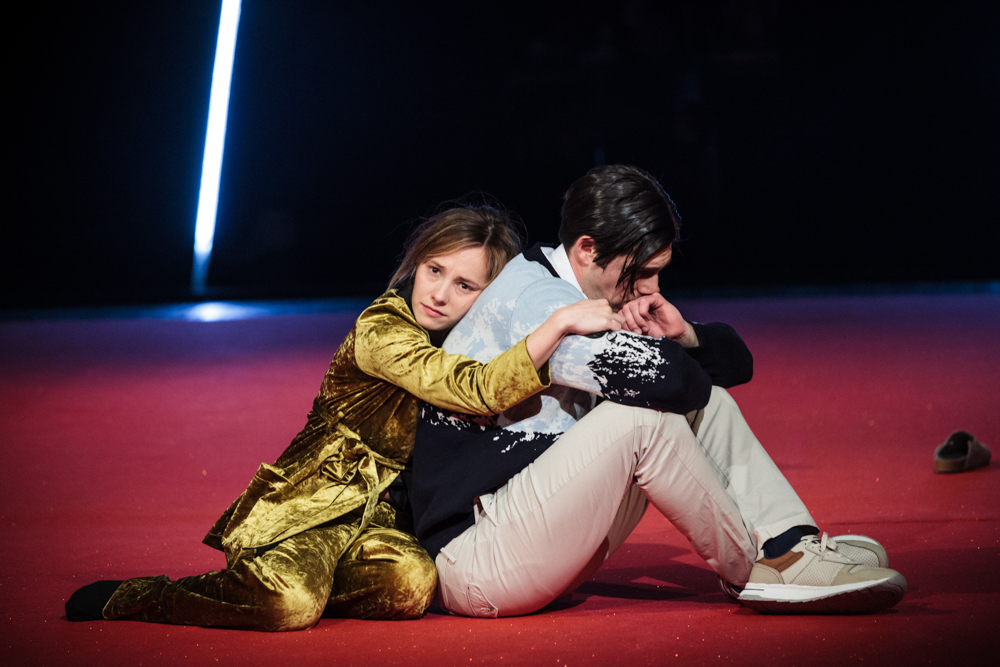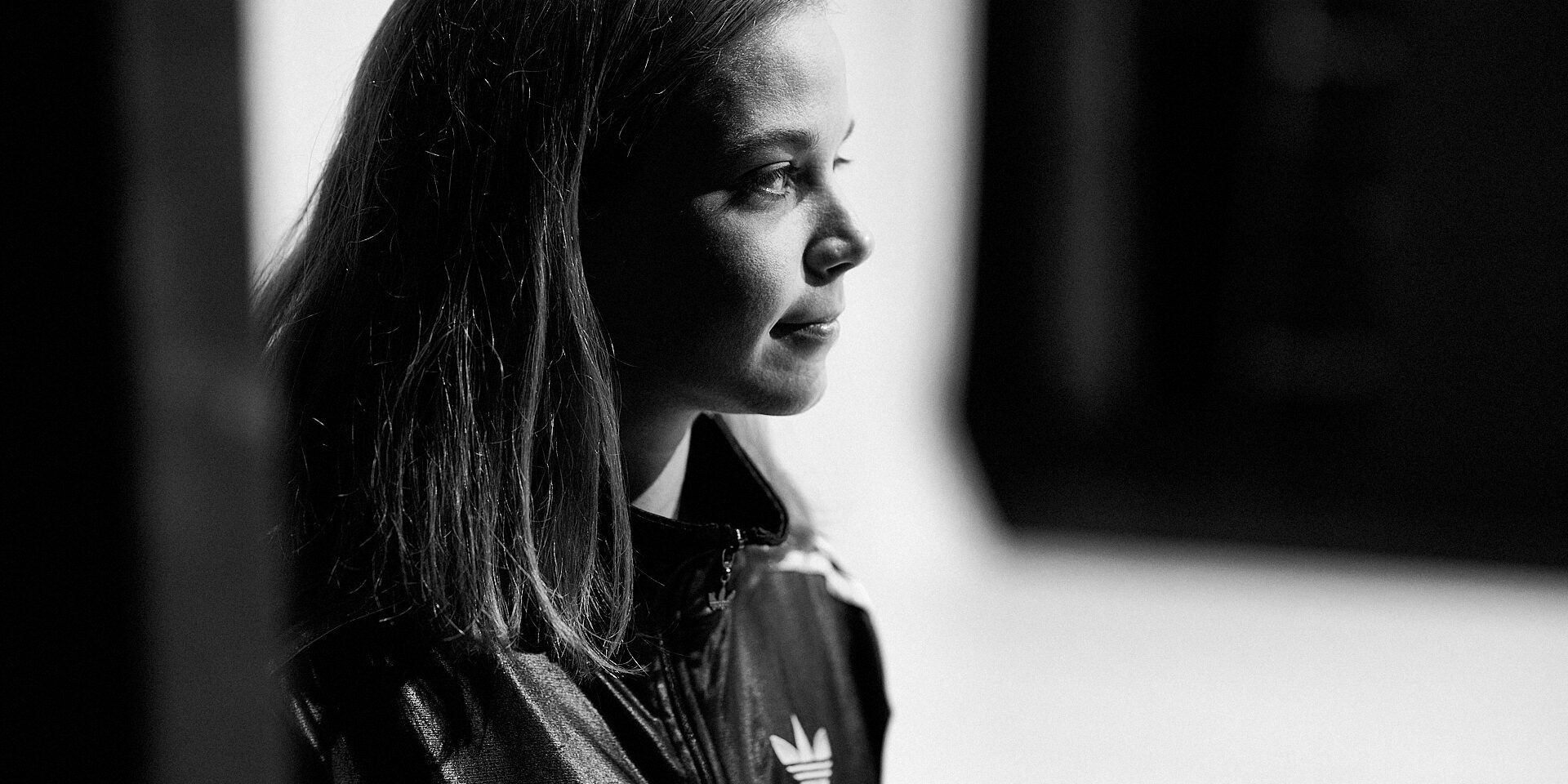Jovana Tomić recently staged Alice Birch’s Revolt at Atelje 212. She talks to Natasha Tripney about intimacy, how she views the role of the director and why she prefers adapting novels for the stage.
Natasha Tripney: What was your first impression of Alice Birch’s play Revolt? What made you want to stage it?
Jovana Tomić: Anger! Two years ago, when I first read the play, there were a lot of big things happening in Serbia, and also in Europe, in respect of women’s rights. Anger was the first emotion that felt adequate to me when I read the text.
But then I thought, okay, what lies behind all these feelings? When I started to work on the text, and to prepare it for performance, I discovered, rereading it, that there is a lot of love in the play. And I really liked this contradiction – or, at first, this looks like contradiction, but actually, it’s not. That’s why I wanted to explore what’s happening in this play, to explore all of the emotions in these microworlds.
Natasha Tripney: The writer says within the text that this is not a ”well-behaved play.” As a director, how did you respond to this invitation, this provocation?
Jovana Tomić: When you first read that, it puts a little bit of pressure on you as the director, because you don’t want to be boring, you don’t want to be conventional. But, actually, it’s really good thing because it pushes you forward. You start to think about the form and the ways in which you will tell these stories.
Natasha Tripney: Can you tell me a bit more about your formal approach to the text and the different episodes that make up the play?
Jovana Tomić: She [Alice Birch] has created four different worlds inside one text. So, it was really exciting to create four completely different worlds in terms of the aesthetic. There are some stories that really connected personally with me and some questions that really intrigued me,
Natasha Tripney: Throughout the performance, the means of creating these scenes are visible on stage. What was your thinking behind showing this part of this labour on stage?
Jovana Tomić: Alice Birch also said at the beginning of the text that she is against scenography. Everything should be transparent. That’s also really what I feel about theatre. I don’t believe in illusion or pretending we are not in the theatre.
We also switched the order of the scenes. The first part I felt should be really intimate, that we should find a way of creating intimacy with these characters. With the second part, I felt it should be about hypocrisy. I wanted to present these really sexy people, these liberal, leftist, cool guys, because I think they can be the biggest threat when we’re talking about serious ideas, real problems, feminism. In this scene, I wanted to create a really great party atmosphere. We are talking about serious topics, but, actually, really, we are not. Because we also want to have fun, and to make everything really easy. It’s easy to say, yes, of course, I’m feminist, but everything stays on surface. Those are just saying the usual things we hear every time we go to some intellectual party.
With the later part of the play, the scene between the mother, daughter and grandmother, I felt we needed to move beyond realism. There is a lot of strong emotions between these three women and it could easily slip into cheap romanticism. That was a big risk. I talked a lot with my colleagues, with the scenographer and costume designer, about this scene. We were all a little bit scared because we were afraid that visuals could swallow the emotions, swallow all those tiny nuances that happen between the characters, but we said, okay, let’s take that risk.
This is a scene about the granddaughter growing up. At the end we ask ourselves what will happen to her in the future. So, our inspiration for this scene was Alice in Wonderland meets Almodovar. I really like how, in his films, all the women are on the verge of a breakdown. yet the colours are so bright and shiny.

Revolt at Atelje 212
Natasha Tripney. It strikes me in your work that you’re very interested in establishing these intimacies between the performers and the audience. This felt particularly apparent in your production of Movement, which takes place in the backstage spaces of the BITEF Teatar. Why did you choose to use the space in this way?
Jovana Tomić: I feel that there is this great potential of theatre and that we directors don’t always use it. We have these people inside one room together with actors and I think it’s the most natural thing that we try to connect directly. but we are always using the fourth wall and pretending we are not in the same room. I’m always trying to find some space for that kind of communication [between actors and audience]. But it’s also tricky. Because I think people’s first reaction to this kind of intimacy is fear. “Please, don’t torture me. Don’t scare me.”
There’s also a tendency of actors to use their power and want to dominate the audience. But it’s more exciting if they are equal. If the performers are vulnerable, then the audience can feel something more.
I think it is possible to achieve this in BITEF. When I read Dimitrije {Kokanov’s] text, my first impulse was that it should be really intimate, like sitting in a living room and talking with friends. We were exploring the limits of what we could do and where we could go; could we maybe touch somebody? And, if so, what is too much? It was a really interesting process.
Natasha Tripney: In Movement, the audience is split into small groups. What were the logistical challenges of staging the performance in that way?
Jovana Tomić: All the characters in the text are stuck. They’re stuck in their problems. So, I thought, If they are stuck, then the audience should move from one story to another instead. We started to negotiate the idea of moving through the theatre. It was complicated, because BITEF is a small theatre and we were going to block the whole theatre because we needed all the space. That was kind of a fight! Then we needed to negotiate the different routes through which the audience would move. In one rehearsal, we lost one audience group! We were searching for them and the whole show stopped. This was just before the premiere. It was a huge experiment for all of us. There weren’t any rules for this. We had to discover the rules in the rehearsal process. It was really stressful, but really exciting.

Movement at BITEF Teatar
Natasha Tripney: What was your approach to adapting Rumena Bužarovske’s Moj Muž. [My Husband]? What choices did you make in bringing that text to the stage?
Jovana Tomić: I chose five stories from the book, all of which featured two women. With Dimitrije [Kokanov], we developed those female characters who were the ‘other’ in the book – the friend or colleague – in the adaptation, we put that other in the first place.
It’s also – again – about intimacy. On stage we have only a bed. Everything is about the bed. That was funny to me because people talk about all the magic that’s happening in bed, and now instead we have two women, who are constantly talking about their husbands but the husband never comes. We never see him. There is no man on stage. It’s just the two of them, talking.
There are only two actresses and they keep changing roles, which again was a big challenge because they are talking directly to the audience and it’s a small stage. They’re really close to the audience and the audience is really close to the bed. The reactions to that are interesting. But, really, it’s all about contact and transferring the emotions. That’s the main motive running through my work.
Natasha Tripney: What made you want to study theatre in the first place? What drew you to the performing arts?
Jovana Tomić: In high school, I did some acting, I went to a theatre group for teenagers. Directors were coming and working with us kids. There was one really unpleasant director who was screaming at us and I was thinking, why would anyone want to be an actor? I decided I really didn’t want to do that anymore. But I stayed in that theatre and I watched what the directors did, what the scenographers did, what the costume designers did.
Natasha Tripney. What was your early work as a director like?
Jovana Tomić: My graduate performance was Max Frisch’s The Arsonists at Atelje 212. It was a traumatic experience because I was really young. At university, you are treated like a little king. Our professors told us: you are the director, you are the main guy in the room, everyone should listen to you, you must be an authority. And you must scream if you want to scream! Our school really nurtures the idea of conflict between actors and the director. The number one rule is that actors are stupid, and that you should trick them into doing as you say. But, eventually, you realise that wrong on every level. You must overcome that. I needed several years to leave behind everything that school taught me and to start to innovate.
Natasha Tripney: There have been a lot of recent conversations about power in theatre – about the misuse and abuse of power. How has your thinking about power evolved over the years?
Jovana Tomić: When I was 22, I didn’t know anything about the world. I though my professors were the smartest people in the world. But, after university, I started to realise that theatre has this potential to create a collective from people who would maybe never be in the same room as one another in different circumstances – and that’s beautiful. I think it’s one of the outstanding points of collective work. That everybody wants to be in that collective, it’s not always like that, but in most cases, it is, and in essence, theatre is a beautiful thing. It’s not about power structures. I think the director’s main role is to create an atmosphere where everybody is able to share their ideas and create together.
Natasha Tripney: Do you have a particular interest in UK plays? What inspires you to work on a project?
Jovana Tomić: Actually, I usually choose prose, novels, which I adapt for the theatre. I feel that many theatre plays are closed. They tell you how you should do them and I don’t feel much freedom. With novels there are several ways in which you can navigate through the content and chose your own path. The thing that unites all the work that I have done is that they give you freedom. The text is just the starting point and then you can do whatever you want.
Main image; Duško Miljanić
For tickets and more information, visit: Atelje212.rs and teatar.bitef.rs
Further reading: review of Revolt at Atelje 212
Natasha Tripney is a writer, editor and critic based in London and Belgrade. She is the international editor for The Stage, the newspaper of the UK theatre industry. In 2011, she co-founded Exeunt, an online theatre magazine, which she edited until 2016. She is a contributor to the Guardian, Evening Standard, the BBC, Tortoise and Kosovo 2.0








